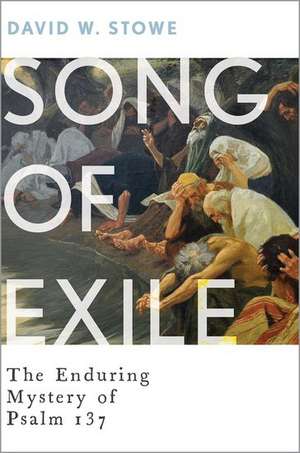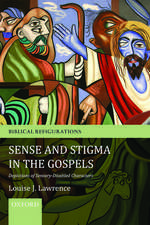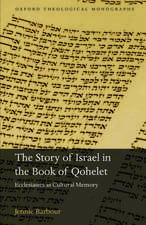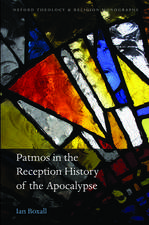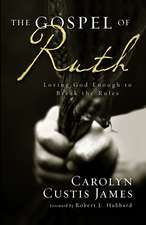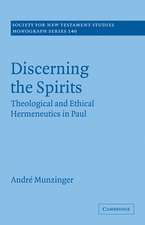Song of Exile: The Enduring Mystery of Psalm 137
Autor David W. Stoween Limba Engleză Hardback – 19 mai 2016
Preț: 187.26 lei
Preț vechi: 229.37 lei
-18% Nou
Puncte Express: 281
Preț estimativ în valută:
35.84€ • 38.95$ • 30.13£
35.84€ • 38.95$ • 30.13£
Carte tipărită la comandă
Livrare economică 10-16 aprilie
Preluare comenzi: 021 569.72.76
Specificații
ISBN-13: 9780190466831
ISBN-10: 0190466839
Pagini: 232
Ilustrații: 10
Dimensiuni: 155 x 239 x 23 mm
Greutate: 0.45 kg
Editura: Oxford University Press
Colecția OUP USA
Locul publicării:New York, United States
ISBN-10: 0190466839
Pagini: 232
Ilustrații: 10
Dimensiuni: 155 x 239 x 23 mm
Greutate: 0.45 kg
Editura: Oxford University Press
Colecția OUP USA
Locul publicării:New York, United States
Recenzii
Stowe's study of Psalm 137 is one of the best examples of reception history written for nonspecialists, a riveting investigation that takes the reader into surprising places of American culture and beyond...[I]t proves to be nothing short of eye opening.
David Stowe's focus is on subsequent, even contemporary use of the psalm, what we now call 'reception history.' Readers will be astonished by the rich inventory of belated uses of the psalm that Stowe has provided, mostly musical and in contexts of anguish. The psalm is now impressively contemporary with its pulses of pathos, resolve, and a will for vengeance.
Breathtaking! David Stowe's dazzling gloss on Psalm 137 and its compelling transit across centuries of American and European cultural, religious, and musical life is a wondrous testament to learning, curiosity, and the power of enthralling narrative. Song of Exile uplifts the power of words as few books do, a haunting exercise of scholarship and moral imagination.
In this elegant account of Psalm 137 and its textual and musical reception, David Stowe marshals extraordinary erudition and interpretive imagination to fashion a probing inquiry into the perennial human experience of exile. Song of Exile invites readers to ponder history, memory, vengeance, forgiveness, and forgetting as classically expressed in the Psalmist's lyric 'By the Waters of Babylon' and movingly explored by Stowe's commentary on its afterlife from the biblical era to our own times.
David Stowe's focus is on subsequent, even contemporary use of the psalm, what we now call 'reception history.' Readers will be astonished by the rich inventory of belated uses of the psalm that Stowe has provided, mostly musical and in contexts of anguish. The psalm is now impressively contemporary with its pulses of pathos, resolve, and a will for vengeance.
Breathtaking! David Stowe's dazzling gloss on Psalm 137 and its compelling transit across centuries of American and European cultural, religious, and musical life is a wondrous testament to learning, curiosity, and the power of enthralling narrative. Song of Exile uplifts the power of words as few books do, a haunting exercise of scholarship and moral imagination.
In this elegant account of Psalm 137 and its textual and musical reception, David Stowe marshals extraordinary erudition and interpretive imagination to fashion a probing inquiry into the perennial human experience of exile. Song of Exile invites readers to ponder history, memory, vengeance, forgiveness, and forgetting as classically expressed in the Psalmist's lyric 'By the Waters of Babylon' and movingly explored by Stowe's commentary on its afterlife from the biblical era to our own times.
Notă biografică
David W. Stowe teaches English and Religious Studies at Michigan State University, where he is interim chair of the English Department. During the 2012-13 academic year, Stowe held a research fellowship at Yale's Institute of Sacred Music. His most recent book is No Sympathy for the Devil: Christian Pop Music and the Transformation of American Evangelicalism. His previous book, How Sweet the Sound: Music in the Spiritual Lives of Americans won the Deems Taylor Award from ASCAP.
